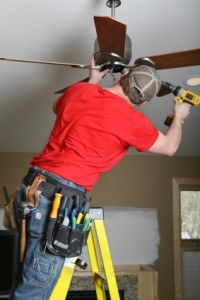Thinking About Installing a Ceiling Fan? Read This First!

Ceiling fans are electrically-powered fans suspended from the ceiling. Unlike air conditioners, they do not change air temperature, instead, they circulate air. They only introduce movement to the air through their rotating paddles. There are, however, some fans that reverse the direction in which the blades move, therefore helping in heating and cooling air. They use much lesser power, but are nevertheless effective and efficient. Westfield ceiling fan installation is a perfect substitutes for the more expensive and for high-energy-consuming air conditioning units for there’s more to the fresh breeze they provide. Whether they are contemporary or not, they accentuate and add character to absolutely any Westfield room.
A ceiling fan is composed of an electric motor, blades or paddles, metal arms, flywheel, rotor and others. The paddles, usually three to six in number, connected by metal arms or blade irons to the motor, mount either under, on the side of or on top of the electric motor. Other fans vary with style and may include downrods, metal pipes used to suspend the fan from the ceiling, switch housing and even lamps, uplights or downlights.
There are several types of fans that vary based on energy consumption and style. A cast-iron ceiling fan is solidly built, with a housing encasing a very heavy-duty oil-bath motor, which needs periodic oiling. A stack-motor ceiling fan whose fan blades are mounted to a central hub called “flywheel” is an energy efficient motor far less costly to operate than air conditioning equipment. A direct-drive ceiling fan, which is the least expensive, uses a motor with a stationary inner core with a shell that revolves around it. A friction-drive ceiling fan which consumes very low energy employs a low-torque motor mounted transversely to the flywheel.
There are also different ways on how to operate ceiling fans in Westfield. Some come with the pull-chain or pull-cord control. They are equipped with metal chains or cloth cords, which, when pulled, cycle the fan. Succeeding pulls either change the fan speed or turn the fan off. Other fans operate on variable-speed control where a dial, which works like a dimmer switch, is mounted on the fan. Some fans have their controls mounted on the wall while others come with wireless remote controls that transmit radio frequencies or infrared control signals to the receiver installed in the fan.
Since their first appearance in the early 1860s, ceiling fans have evolved into something much more useful. They have significantly served their purpose – that is to circulate the air we need and breathe. Your Westfield electrical contractor can help you select and install the perfect ceiling fan for your home.


